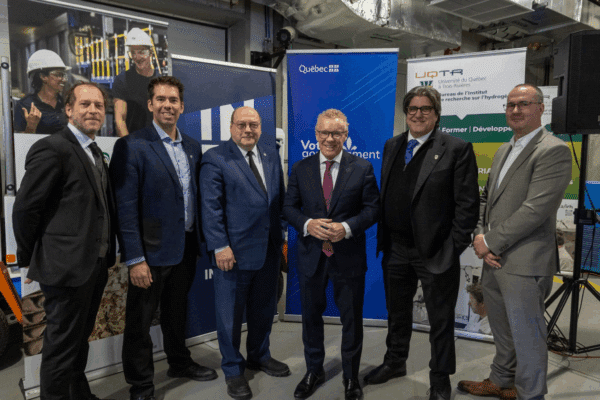- Research
For International Women’s Day, March 8, we spoke with Professor Monique Bernier, whose career at the Institut National de la Recherche Scientifique (INRS) spans more than 25 years. In December she was awarded the 2019 Prix Planète for Outstanding Research Career during the institution’s 50th anniversary celebrations.
Conversation with a woman who is not only a passionate researcher, but a strong believer in the importance of training the next generation of scientists.

In 1993, you were the first woman to join the INRS in Québec City. How have you contributed to gender equality in your workplace?
Monique Bernier : I started as a professor at the Eau Research Centre at INRS through the program “professeure-boursière” with the Natural Sciences and Engineering Research Council of Canada (NSERC) designed to help women get into engineering. The director at the time was pleased to have a woman on the team. He said it changed the dynamics of the faculty assembly.
On my research team, I’ve had as many women as men. I’ve trained some very driven young women. One even went on to become the first remote sensing researcher at Hydro-Québec.
You play an active role with your students. How important is mentoring to the next generation, especially for young women starting a career in the sciences?
M. B. : When you’re starting your career or pursuing graduate studies—whether you’re male or female—you need a mentor. I have organized and chaired conferences aimed at helping students find opportunities and meet mentors.
It is extremely important to me to encourage my female students. Throughout my career, I have always been open and available to talk with them about their research, but also about their personal life and goals.
I remember one of my students, who was about to start her PhD in January, telling me she was pregnant before she had even told her parents. She asked me if she could start the program anyway. I told her she could. She went on to have three children during her doctorate. Quite a challenge, but she did it! I encouraged her a lot.
More and more young women are going into remote sensing. I think that paternity and maternity leave is a big help today, allowing people to study longer. It helps them balance school and family.
Did you receive mentoring like that during your research career?
M. B. : I had a number of mentors during my career. The first was a professor at Université de Sherbrooke, one of the pioneers in the field of remote sensing, Professor Ferdinand Bonn. I was his first graduate in remote sensing in the Department of Geography. He helped me write my first paper and land my first job at the Canada Centre for Remote Sensing (CCRS). At CCRS, I had the opportunity to work with Susan Till, a woman section head who had leadership responsibilities. Even though she did not officially mentor me, she was a big influence. She showed me that women can have a career in research!
My master’s professor connected me with a woman researcher, Anne Kahle, at a conference in the United States. She saw how enthusiastic I was and said, “If you’re interested in research and want to publish your own work, get a PhD.” That made an impression on me. Four years later, I jumped at the opportunity to earn a PhD in radar remote sensing. During my PhD studies, I got married and started a family.
How do you view your scientific career as a woman?
M. B. : During my career, I haven’t really encountered any obstacles as a woman researcher in terms of grants or publications. There is a growing awareness of this. NSERC even has a policy to prevent discrimination and fight bias, even unconscious bias.
I am very satisfied with my career path. I’ve had great opportunities and a lot of fun with the people I’ve worked with. I feel like I’ve made a difference for the next generation. A number of my female students have become professors and researchers, and I’m very proud of them.
About Professor Monique Bernier
Professor Monique Bernier joined INRS in 1993. Her research is focused on the development of radar remote sensing applications in hydrology and glaciology, and the monitoring of climate change impacts on northern environments. Her work has led to the development of technologies that help the prediction of ice jam flooding. She received the Larry Morley Gold Medal from the Canadian Remote Sensing Society in recognition of her valuable contributions to the field.



